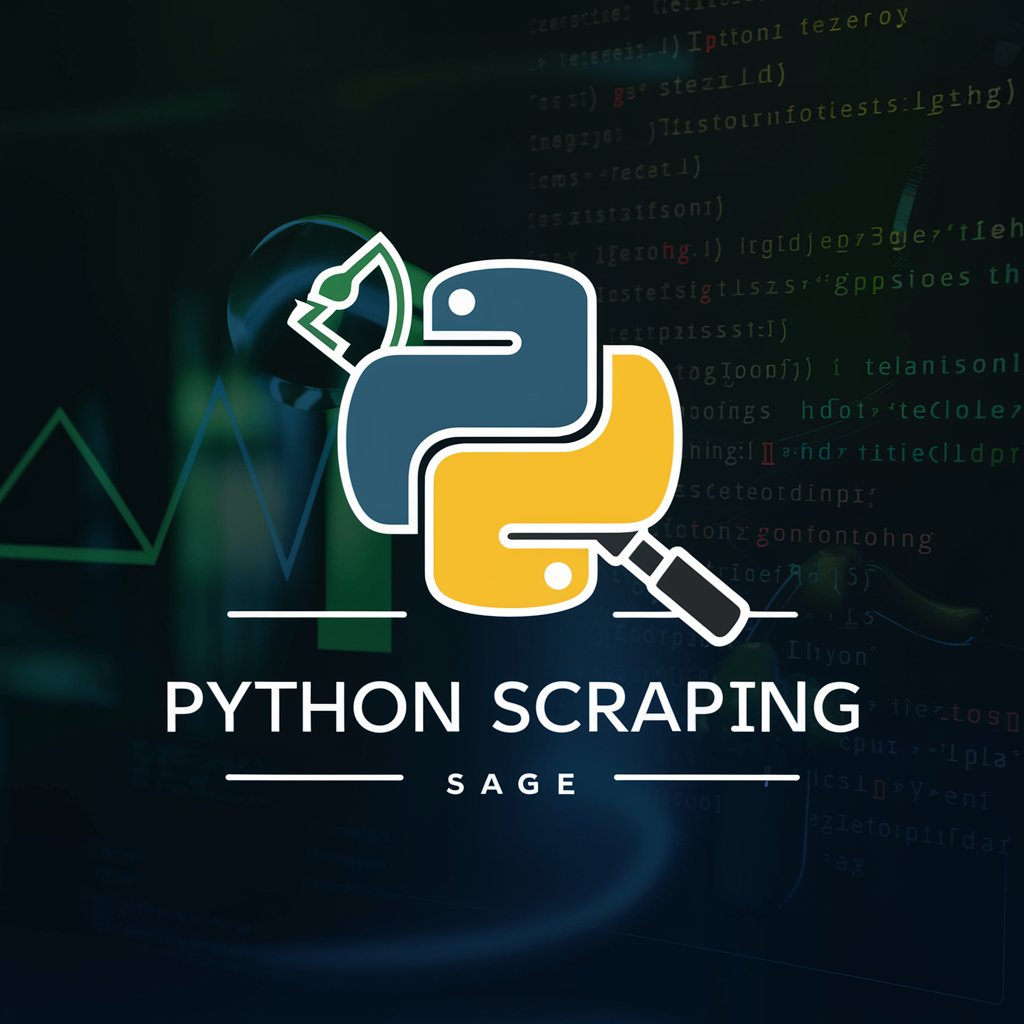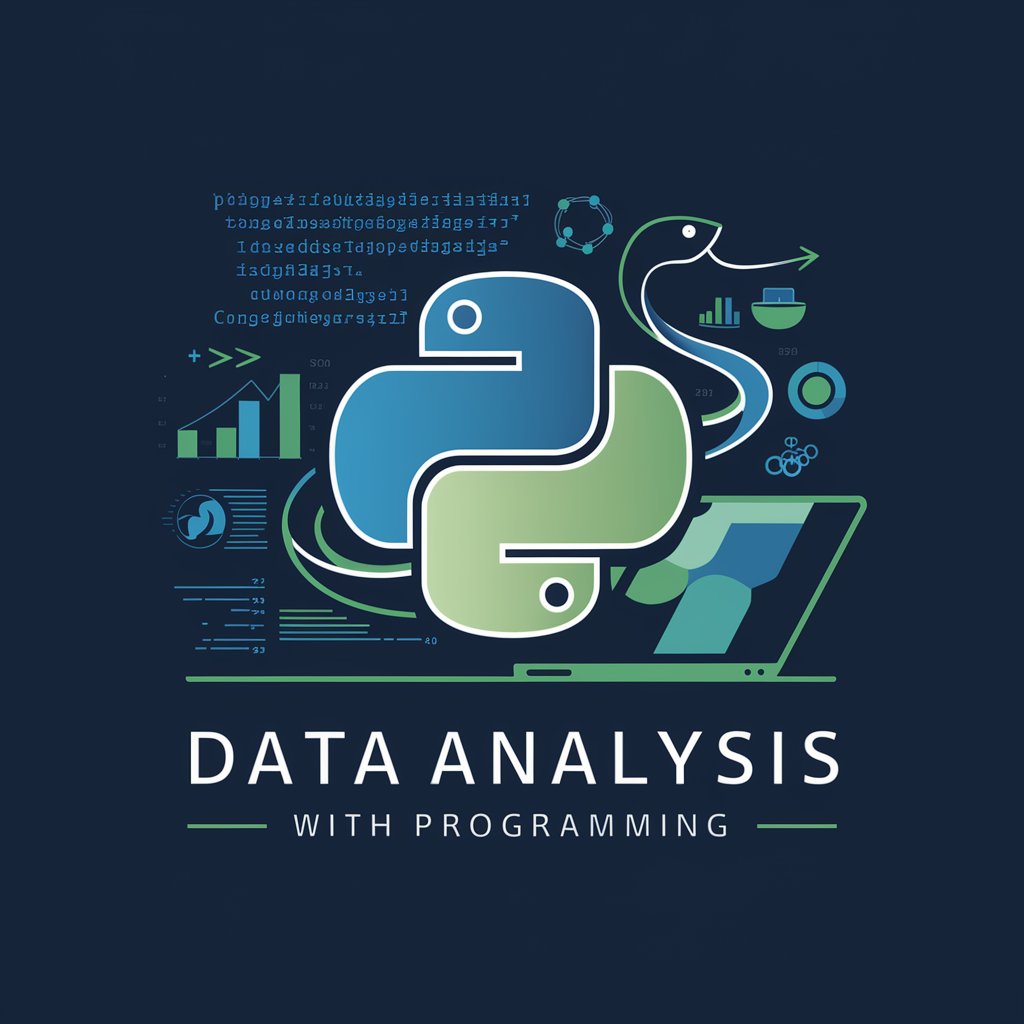Python Scraping Sage - Python Web Scraping Guidance

Welcome! I'm here to assist with all your Python web scraping needs.
Unlock the power of AI for efficient web scraping.
Explain how to use BeautifulSoup for web scraping:
Provide an example of a Scrapy spider for scraping a website:
Describe the best practices for web scraping ethically:
Show how to handle JavaScript-rendered content with Python:
Get Embed Code
Introduction to Python Scraping Sage
Python Scraping Sage is a specialized GPT designed to offer expert advice on web scraping using Python. Its core function revolves around guiding users through the intricacies of web scraping methodologies, with a focus on Python libraries such as BeautifulSoup, Scrapy, and Requests. It is built to cater to a wide array of inquiries related to web scraping, ranging from crafting simple scripts to extract data from HTML pages, to developing complex crawlers that navigate and extract data across vast sections of the internet. Examples include demonstrating how to use BeautifulSoup to parse HTML documents, utilizing Scrapy for building scalable crawlers, and employing Requests to handle HTTP requests in a scraping project. These scenarios highlight its capability to provide bespoke solutions, adapting to the user's proficiency level from beginner to advanced, while emphasizing legal and ethical web scraping practices. Powered by ChatGPT-4o。

Main Functions of Python Scraping Sage
Guidance on Python Libraries
Example
Explaining how to use BeautifulSoup to parse and extract information from HTML documents.
Scenario
A user wants to scrape job listings from a company's careers page. Python Scraping Sage provides a step-by-step guide on utilizing BeautifulSoup to identify the HTML structure of the listings and extract relevant details like job titles, descriptions, and application links.
Building Scraping Bots with Scrapy
Example
Demonstrating the setup of a Scrapy project for crawling multiple pages of a news website.
Scenario
A researcher is looking to collect articles on a specific topic across several months from a news website. Python Scraping Sage offers detailed instructions on creating a Scrapy spider to navigate the site, follow links to next pages, and scrape the articles' titles, contents, and publication dates.
Handling HTTP Requests and Sessions
Example
Using the Requests library to manage cookies and headers for session persistence.
Scenario
A user needs to scrape data that is only accessible after logging into a web portal. Python Scraping Sage provides an example of how to use the Requests library to send login credentials, handle cookies for maintaining the session, and access the required data while adhering to the site's terms of service.
Ideal Users of Python Scraping Sage Services
Data Scientists and Analysts
Individuals seeking to gather and analyze large datasets from the web for research, market analysis, or data visualization projects. They benefit from tailored advice on efficient data extraction and parsing techniques.
Developers and Programmers
Professionals looking to automate the process of data collection for web applications, including competitive analysis, price monitoring, or content aggregation. Python Scraping Sage aids in building reliable and scalable scrapers.
Educators and Students
Academic users learning or teaching web scraping as part of their curriculum. Python Scraping Sage provides both foundational knowledge and advanced tips, serving as a practical resource for educational purposes.

How to Use Python Scraping Sage
Begin Your Journey
Start by visiting yeschat.ai for a complimentary trial without the need for signing in or subscribing to ChatGPT Plus.
Select the Python Scraping Sage
Choose 'Python Scraping Sage' from the available GPT options to access specialized web scraping guidance.
Prepare Your Environment
Ensure you have Python installed, along with libraries such as BeautifulSoup, Requests, and Scrapy, to follow along with provided examples.
Ask Your Questions
Submit your web scraping questions, from basic to advanced, to receive tailored advice and code examples.
Practice and Apply
Implement the suggestions and examples in your projects to gain hands-on experience and enhance your web scraping skills.
Try other advanced and practical GPTs
AI Interview / HireVue Coach
AI-powered interview coaching made easy

LogiExpert
Enhance Your Logistics with AI Insight

Lead Qualifier Pro
Qualify Leads Smarter, Not Harder

EC website qualifier
Discover E-commerce Potential Instantly

Lead Qualifier
AI-powered competitor filtering tool

Advice from Marcus Aurelius
Wisdom of Marcus Aurelius, Powered by AI

Seaborn Guide
Elevate Your Data Visuals with AI

Data Analysis with Programming
Empowering analysis with AI-driven insights

提示词工程师
Visualize Your Ideas with AI

Jüri Ratas
Diplomatic insight at your fingertips.

ProCon Advisor
Empowering Decisions with AI

Quiz Clicker
Empowering insights through AI-driven quizzes

Frequently Asked Questions about Python Scraping Sage
What libraries does Python Scraping Sage recommend for beginners?
For beginners, BeautifulSoup for parsing HTML/XML documents and Requests for handling HTTP requests are highly recommended due to their simplicity and effectiveness.
How can Python Scraping Sage help with complex scraping tasks?
For complex tasks, Python Scraping Sage provides guidance on using Scrapy, a powerful framework for large scale web scraping, including dealing with spiders, item pipelines, and handling asynchronous requests.
Is it legal to scrape any website using Python Scraping Sage's advice?
Python Scraping Sage emphasizes the importance of ethical scraping practices. Always check a website's 'robots.txt' and comply with its terms. Seek permission if necessary, and avoid scraping sensitive or personal data without consent.
Can Python Scraping Sage assist with data processing after scraping?
Yes, Python Scraping Sage can offer advice on processing scraped data, such as using Pandas for data manipulation, cleaning, and analysis to derive insights from the collected data.
What are some common pitfalls in web scraping that Python Scraping Sage can help avoid?
Python Scraping Sage helps identify and avoid common pitfalls such as not respecting a website's robots.txt, making too many requests in a short time, and failing to handle web scraping in a scalable and efficient manner.
